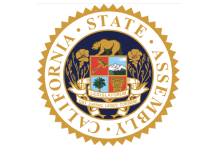The Assembly Judiciary Committee today will consider two California Chamber of Commerce-opposed job killers, one dealing with disclosing pay data and the other about the legal standard for filing certain harassment/discrimination claims.
The committee will consider:
- SB 1284 (Jackson; D-Santa Barbara) Unfairly requires California employers to submit pay data to the Department of Industrial Relations, potentially creating a false impression of wage discrimination or unequal pay where none exists and, therefore, subjecting employers to unfair public criticism, enforcement measures, and significant litigation costs to defend against meritless claims.
- SB 1300 (Jackson; D-Santa Barbara) Allows Anyone to Sue for Failure to Prevent Harassment or Discrimination Even Where No Harassment or Discrimination Occurred—Significantly increases litigation by creating a new stand-alone private right of action allowing a plaintiff to sue for failure to prevent harassment or discrimination when no harassment or discrimination actually occurred, limits the use of severance agreements, and prohibits the use of a general release or nondisparagement clause in employer/employee contracts.
SB 1284
CalChamber has identified the bill as a job killer because it could create a false impression of wage discrimination or unequal pay where none exists and, therefore, subject employers to unfair public criticism, enforcement actions, and significant litigation costs to defend against likely meritless claims.
CalChamber is leading a large coalition opposing the bill and has raised the following additional concerns:
- Exposes Employers to Public Shaming for Wage Disparities That Are Not Unlawful. The potential disclosure of the pay data could lead to public shaming of employers because, while the aggregate data might disclose wage disparities, wage disparities do not automatically equate to wage discrimination or a violation of law.
- SB 1284 Requires California Employers to Comply with a New, Separate Mandate. As drafted, SB 1284 presumes that the federal EEO-1 pay data reporting requirement already went into effect; however, the pay data provision of the EEO-1 reporting requirement was suspended by the federal government. Thus, SB 1284 creates a new reporting requirement for employers that do business in California.
- SB 1284 Relies Upon Job Titles and Classifications to Compare Jobs, Which Undermines the Intent of the Fair Pay Act to Compare “Substantially Similar” Positions and, as Such, Will Provide a False Impression of Wage Discrimination When None May Exist. Collecting pay data in the aggregate will likely demonstrate wage disparity amongst employees in the different job classifications or titles according to gender that are not unlawful.
- SB 1284 Fails to Take into Consideration an Employer’s Objective, Non-Discriminatory, “Bona Fide Factors” for the Wage Disparity and, Therefore, Undermines the Balance Provided by the Labor Code. These factors will not be effectively captured in the aggregate data under SB 1284 to adequately defend against undue criticism and, therefore, will create the impression of an equal pay violation where none actually exists.
- SB 1284 Utilizes Data that May Be Impacted by Employee Choices. SB 1284 requires employers to provide pay data regarding an employee’s total earnings as shown on the Internal Revenue Service’s Form W-2. However, a W-2 form does not take into account an employee’s own decisions and actions that can also create wage disparity that has nothing to do with discriminatory intent by the employer.
SB 1300
SB 1300 is a job killer because it creates a new stand-alone private right of action for failure to prevent harassment or discrimination where no harassment or discrimination actually occurred and limits the use of nondisparagement agreements and general releases. These provisions will significantly increase litigation against California employers and limit their ability to invest in their workforce.
CalChamber is also leading a large coalition opposing SB 1300 because the bill:
- Allows Anyone to Sue a Company for Failure to Prevent Harassment and Discrimination, Even If No Harassment or Discrimination Occurred. This radical lowering of the bar would result in a vast increase in litigation over potentially trivial workplace matters that do not rise to the level where the courts should be involved.
- SB 1300 Unnecessarily Creates a New Stand-Alone Private Right of Action. Any individual could pursue a claim against an employer seeking damages (compensatory damages, injunctive relief, declaratory relief, punitive damages, and attorney’s fees) simply by alleging that the employer did not take all reasonable steps to prevent harassment or discrimination when no harassment or discrimination actually occurred.
- SB 1300 Is Unnecessary and Exposes Employers to Costly Litigation. Fair Employment and Housing Act (FEHA) litigation is expensive. A 2015 study by insurance provider Hiscox about the cost of employee lawsuits under FEHA estimated that the cost for a small- to mid-size employer to defend and settle a single plaintiff discrimination claim was approximately $125,000.
- Prohibiting General Release Provisions Will Deter Employers from Conducting Self-Audits and Providing Severance Agreements. Not only is the language of SB 1300 unclear, but the bill also provides a disincentive to employers to take remedial action, such as wage and hour self-audits.
- SB 1300 Will Chill the Use of Settlement Agreements, Thereby Disadvantaging Employers and Employees Alike. As the benefit of a settlement agreement for the employer is reduced, the less likely an employer is to settle claims out of court. Thus SB 1300 will drive employers to fight these cases in court instead of utilizing early resolution.
Action Needed
SB 1284 and SB 1300 will be heard in the Assembly Judiciary Committee today. CalChamber asks members to contact their Assembly representatives and members of the committee and urge them to oppose SB 1284 and SB 1300 as job killers.
Staff Contact: Laura Curtis


